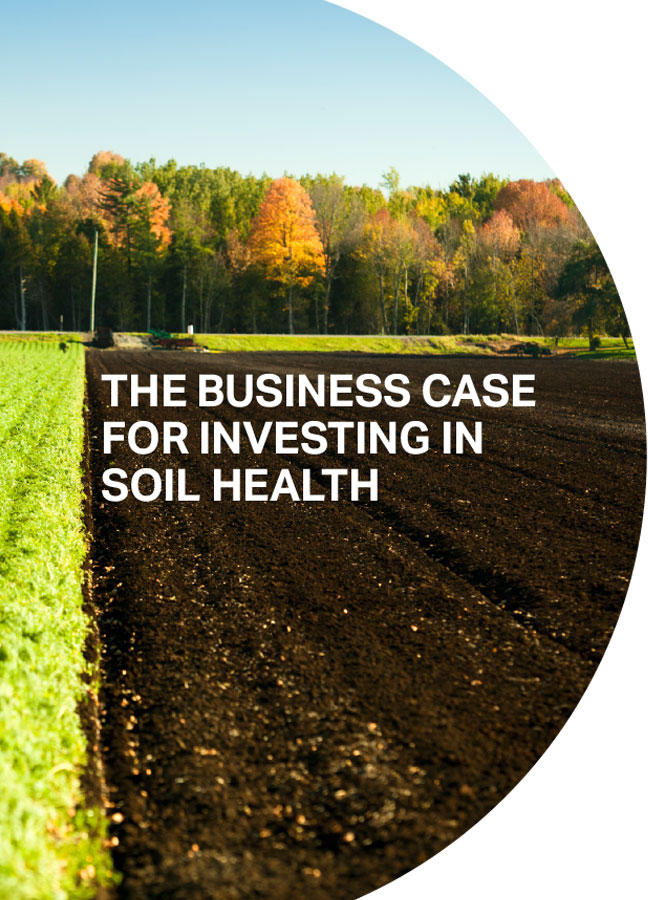The Business Case for Investing in Soil Health
Soil health is a pressing global issue that sits at the heart of three UN conventions (UNCBD, UNCCD and UNFCCC). There is an urgent need to mobilize nature-based solutions to address the challenges of climate change. Global soils contain two to three times more carbon than the atmosphere – however, by working with nature and improving soil health, increased carbon sequestration can help to reduce emissions and withstand some of the unavoidable effects of climate change.

The Six Dimensions of the Business Case
Securing and enhancing crops and supply chains
Supporting crop productivity is not only about managing plant nutrition: wider soil health is important to allow crops to access water and nutrients and increases climate resilience.
Businesses need to promote and enable soil management practices in holdings, operations and supply chains that improve soil physical, chemical and biological properties to maintain and improve fertility.
Helping farmers overcome barriers to changing practice can be key. Whilst farmers financially benefit from practice changes that boost crop productivity and resilience in a longer-term, initial costs and perceived risks in changing practice may need to be overcome.
Water resources and risks
Healthy soils can infiltrate and store more water resulting in reduced flood and drought risks and improved water quality downstream.
Reduction in soil losses and increasing nutrient retention in soils benefits water quality and downstream water infrastructure, users and ecosystems.
Maintaining soil health for water benefits requires partnership with local communities and land managers who have invaluable local knowledge and skills.
Further building the scientific evidence base around the link between soil health, and water would help build awareness and capacity for investing in soil management for water.
Climate change mitigation
Soil health can help mitigate against climate change by providing avoided emissions and negative emissions.
Increasing the soil organic matter content of agricultural soils for mitigating climate change is a win-win option for farmers and value chains: building soil organic matter increases productivity and resilience to climate change.
Prioritizing the development and implementation of approaches to measuring and verifying changes in soil carbon stocks opens up opportunities for insetting or offsetting corporate carbon emissions.
Biodiversity and conservation
Soil degradation has consequences for biodiversity as it drives land degradation and conversion, pollutes waterways, contributes to climate change, and decreases soil biodiversity.
Maintaining and improving soil health and reducing land conversion, pollution and biodiversity loss can benefit farmers, agribusiness, and farm communities by maintaining agriculture’s social license to operate.
Healthy, biodiverse soils can reduce costs by limiting the need for soil amendments.
The science of soil biodiversity is rapidly evolving. Proactive attempts to maintain and improve soil biodiversity can limit unpleasant surprises to farmers, agribusiness, and society.
Enabling environment – policy, finance and partnerships
Encourage public-private partnerships that are crucial to support investment, innovations and technology and knowledge exchange around modern agriculture practices.
Support science-based regulatory frameworks that incentivize producers to adopt sustainable soil management practices and guide consumers to demand sustainably produced products.
Routinely incorporate sustainable soil management into policy frameworks (considering market-based economic instruments) and create the appropriate institutional structures.
Stimulate good tenure and governance that promotes equity and attracts long-term sustainable soil investments. Responsible governance of land tenure systems leads to more sustainable and prosperous outcomes, building stability, investor confidence, and peace.
Elevate the significant, long-term cost-saving benefits of soil health management practices, catalyzing the opportunity for the farm financial system to collaborate with farmers.
There are opportunities for business innovations (e.g. in finance, insurance, delivery of extension services, digital agronomy) to unlock the potential of smallholder agriculture and facilitate investment in soil health and high-quality inputs that can benefit farmer livelihood.
Next Steps to Accelerate Action
1. Lower the hurdles to practices that promote soil health:
for example, by exploring value-capture systems that suports the grower in offsetting the initial cost of implementing sustainable agricultural practices that promote soil health.
2. Take advantage of the national context and act locally:
alignment with national soil health policies and the United Nations Convention to Combat Desertification (UNCCD) commitments such as the Land Degradation Neutrality baselines could open up financial options and technical support you can get for your projects in-country.
3. Build partnerships for soil health:
explore supply chain cooperation, public-private partnerships and landscape alliances that spread costs, promote innovation and knowledge exchange and ensure place appropriate solutions.
4. Start now:
the basis is there for piloting science-based solutions for integrating soils in reporting, accounting and supply chain assurance. For example, start by incorporating soil carbon into current carbon accounting and setting up cost-effective soil health monitoring early on for clear demonstration of results.

